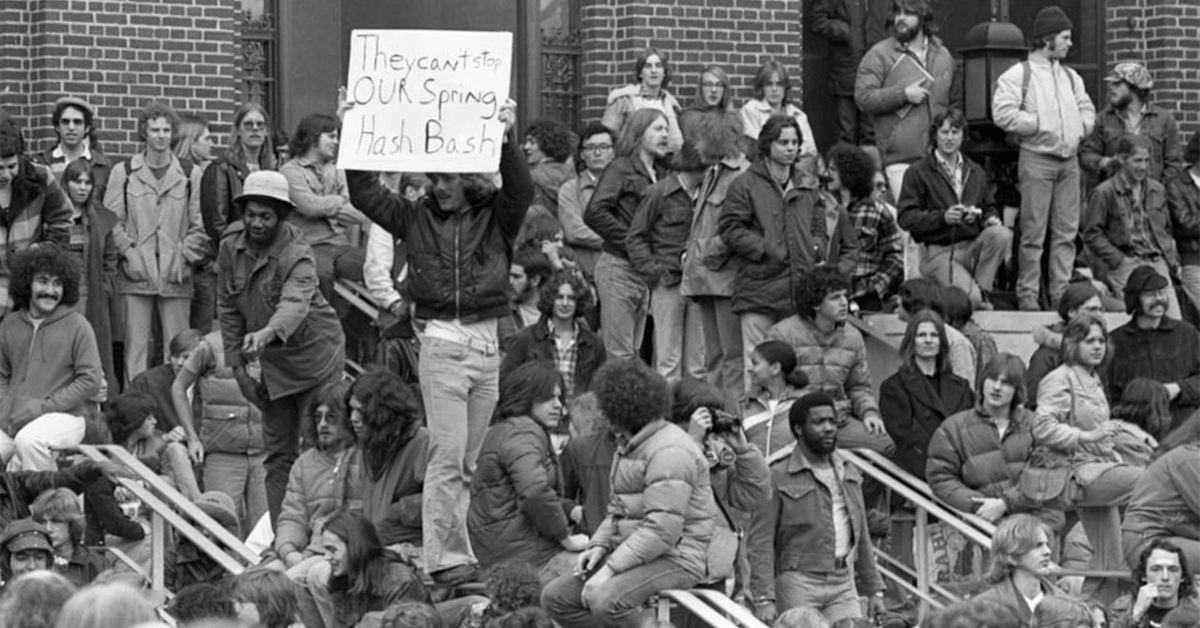Wrestling with Promotion: Ric Flair Sidesteps Personal Queries to Spotlight His Cannabis Brand

In a candid discussion reflecting on his illustrious career and current endeavors, Ric Flair, the legendary Hall of Fame wrestler known as "Nature Boy," shared insights into his life, his brief foray into the cannabis industry, and professional wrestling's tightly guarded secrets concerning cannabis use. Despite Michigan's evolving cannabis landscape, with over 700 dispensaries, Flair remained discreet, focusing more on his journey and current projects than on revealing the hidden tales of wrestling's past.
At 75, Ric Flair has transitioned from the high-energy performances in the wrestling ring to a more subdued presence in the cannabis industry, following the footsteps of other celebrities like Mike Tyson. In March, he promoted his cannabis line, Ric Flair Drip—encompassing pre-rolls, flower, and edibles—across five Detroit-area dispensaries. This venture was named after a popular rap song that featured Flair showcasing his flamboyant lifestyle.
Initially sought for his wrestling insights and the intertwining of his sport with cannabis, Flair navigated the conversation away from the controversial and unknown to focus on his personal narrative and business endeavors. While wrestling fans might have anticipated revelations about the sport's secretive marijuana use or stories of wrestlers circumventing drug policies, Flair maintained a tight-lip, emphasizing his privacy and respect for others' personal lives.
The discussion also touched upon Flair's background, including his adoption and his deep connections to Michigan. Despite his association with the state and fondness for the University of Michigan, Flair chose to center the conversation around his professional journey and recent engagements. He briefly recounted his venture into wrestling after a stint with the University of Minnesota's football team, setting the stage for a legendary career.
While the conversation ventured into his wrestling days and the dynamics of marijuana use within the industry, Flair steered clear of specifics, highlighting his disinterest in discussing others' personal matters. His responses underscored a desire to keep the focus on his current work and away from the potentially sensational aspects of wrestling history.
Did wrestlers use marijuana to treat injuries, rather than turning to pain pills?
"I don't know," Flair said. "I don't ask people about their personal lives."
It wasn't the response I was hoping for, but I pushed forward, asking about how professional wrestling dealt with high-profile marijuana arrests involving specific wrestlers and whether tales of personalities hiring members of their entourage to conceal and transport marijuana were true.
Flair didn't like that.
"I don't like the way this interview is going," Flair said, clearly become irritated. "Why would you ask me to comment about other people?"
I explained I wasn't trying to get him to dish dirt on specific people. "You've been in wrestling and you're known for that, and now you're coming into marijuana ... "
He cut me off.
"I'm more than known for that," Flair said. "I'm the greatest wrestler that's ever lived."
I continued: "I guess I was interested in your connections with ... "
"None of your goddamn business," he said, cutting me off again.
Before the interview dumped like wheelbarrow full of wet concrete, I tried to switch the topic back to his Michigan connections. He said it's a "wonderful" state, he's had "great times" in Detroit, but then he returned to the issue that set him off seconds earlier.
"I don't want to be part of that conversation," Flair said. "Just promote my line. It's the best sh** going ... What's that got to do with my line dropping?"
The interview encapsulated Flair's multifaceted life—from his wrestling accolades and personal stories to his latest business venture. Although the wrestling icon shied away from delving into the industry's clandestine relationship with cannabis, his demeanor and responses painted a picture of a man who values privacy, respects his and others' personal lives, and is focused on his current path in the cannabis industry.
The Dual Origins of Ann Arbor's Hash Bash: A Legacy of Advocacy and Celebration

The commemoration of John Sinclair, a pioneering figure in the cannabis activism movement, remains vibrant within the collective memory of the Hash Bash community in Ann Arbor, Michigan. Sinclair's significant contributions were meticulously documented in an interview by Jamie Lowell, a Hash Bash organizer, ensuring that the foundational story and Sinclair's personal reflections on the event's origins are preserved for posterity. This interview, captured ahead of Sinclair's final appearance at Hash Bash in 2023, is now accessible in a video titled "The Legendary John Sinclair Discusses The Origin Of Hash Bash," serving as a lasting tribute to his impact.
[youtube=jC7LfK-ykGE]
Mint Cannabis Offers Free Solar Eclipse Glasses at Michigan Stores

In anticipation of the upcoming solar eclipse, Mint Cannabis has announced a special offer for its customers across Michigan. The cannabis retailer is providing complimentary solar eclipse glasses to patrons aged 21 and over at all of its six locations throughout the state. This offer is valid immediately and will continue through Monday, April 8. However, customers are advised to act quickly as the glasses will be distributed on a first-come, first-served basis and are available only while supplies last.
For residents in or near mid-Michigan, Mint Cannabis operates a store in Mt. Pleasant, located at 1707 S. Mission St., where the solar eclipse glasses can be obtained. In addition to the Mt. Pleasant location, Mint Cannabis has five other stores in Michigan situated in Monroe, Oxford, Portage, Kalamazoo, and Coldwater, all participating in this unique promotion.
This initiative by Mint Cannabis not only celebrates a significant astronomical event but also provides a safe way for their customers to enjoy the solar eclipse, underscoring the company's commitment to community engagement and safety.
Muskegon to Host Cannabis-Friendly Campsite at The Grassy Knoll This Summer

This summer, Muskegon is set to welcome a unique addition to its array of attractions with the introduction of a cannabis-friendly campsite, courtesy of The Grassy Knoll Recreational Dispensary. Situated on a serene wooded hilltop at 2125 Lemuel Street, and occupying a five-acre space adjacent to its premises, the dispensary is transforming the area into a welcoming haven for cannabis enthusiasts. Named after its picturesque location above Business Route U.S. 31 and Seaway Drive, The Grassy Knoll stands apart from residential and commercial zones, offering a secluded retreat.
Owners Janet Tombre and Fred Cini are gearing up to accommodate at least 50 RVs, with provisions also made for tent camping. The site will be equipped with essential amenities such as portable bathrooms, water supply, picnic tables, and bonfire pits, ensuring a comfortable and enjoyable stay for all visitors.
In a strategic partnership, The Grassy Knoll has teamed up with the Burning Foot Beach Festival, serving as a lodging partner for the event this year. Festival attendees who choose to camp at The Grassy Knoll will benefit from complimentary shuttle service to Pere Marquette, enhancing the festival experience. While pricing details are yet to be finalized, Tombre assures that rates will be competitive with those of the Burning Foot campsite.
This collaboration with Burning Foot Beach Festival is poised to alleviate the lodging crunch experienced during the event, which attracts thousands and sees its 25 RV and 30 tent sites at Pere Marquette sell out swiftly. According to Allen Serio, co-chair of the festival, the partnership will significantly expand lodging options for attendees.
Campers at The Grassy Knoll will enjoy exclusive merchandise and cannabis products, permissible for use on-site. Although the campsite is licensed for consumption, guests will need to visit the dispensary, conveniently located a short walk away, for their purchases.
Operating until midnight, The Grassy Knoll offers a perfect setting for unwinding with a late-night session after a day of beachside fun. Beyond the festival in August, the campsite will accept reservations throughout the summer season, Tombre shared.
The Grassy Knoll is no stranger to hosting community events, having previously organized gatherings for Halloween, Pride month, and Shiba Fest—a fundraiser supporting the Shiba Sequoia Forest reforestation group. In preparation for its upcoming The Frosty Boyz 420 Party, the dispensary is currently setting the stage for a grand celebration. The event will feature a large tent equipped with a consumption lounge and a stage for musical performances by Frosty Boyz and seven other artists on Saturday, April 20th.
Butter Elevates 4/20 Celebrations with Month-Long Festivities and Exclusive Offers

Butter, a distinguished cannabis retailer based in Michigan, is celebrating the month of April with a festive homage to 4/20, offering an array of complimentary cannabis, unique giveaways, and a series of exclusive product releases. This initiative marks the entire month as a special period for cannabis enthusiasts, positioning Butter as a prime destination for the 4/20 holiday festivities.
From now until April 20th, Butter will unveil exclusive new products at their retail outlets each week. This selection is set to include innovative flower strains and a novel spreadable edible, expanding their already popular lineup that features infused ghee and hazelnut spread.
In the lead-up to April 20th, purchasers of any prepackaged eighths of Butter flower or spreadable edibles will be entered into draws for a chance to win an array of exclusive discounts and prizes. The range of prizes will encompass ounces or prepackaged eighths of Butter flower, Butter gift cards, complimentary Butter gummies, Butter-branded apparel, and discounts on future purchases.
The 4/20 holiday has traditionally been a day for the most dedicated cannabis aficionados. However, Butter's diverse product range and unique offerings showcase the myriad ways to enjoy cannabis, extending the celebration beyond just a single day. Their 4/20 activities are designed to inject extra enjoyment into the holiday, encouraging broader participation.
Throughout April, customers spending $25 at Butter retail stores will be rewarded with a free eighth of prepackaged Butter flower. Those who spend $100 will receive a special Friendly Flower tote bag, available through April 30th. Beyond exclusive deals on Butter products, the retailer is also collaborating with various brands to offer specials on other customer-favored products.
These promotions are available at both of Butter's retail locations in Ann Arbor and Berkley, Michigan, subject to stock availability.
John Sinclair: A Legacy of Music, Activism, and the Fight for Cannabis Legalization

John Sinclair, the influential poet, political activist, and beacon of the counterculture movement who ardently championed for cannabis reform, passed away on Tuesday at the age of 82 due to congestive heart failure. Sinclair, a Flint, Michigan native, was renowned for his role as the manager of the politically charged rock band MC5 and as a co-founder of the White Panther Party, an anti-racist group aligning with the principles of the Black Panther Party. His death marks the end of an era for those who admired his tireless advocacy for cannabis legalization and his profound impact on American music and civil rights.
Sinclair's activism was not just limited to his music management or political affiliations; he was a central figure in the push for cannabis reform. Arrested in 1969 for the possession of two marijuana joints, his sentencing to 10 years in prison became a pivotal moment, sparking widespread protests. The most notable of these was the 1971 freedom rally in Ann Arbor, attended by notable figures like John Lennon, Yoko Ono, Stevie Wonder, and Allen Ginsberg, drawing a crowd of 15,000 supporters. This event not only highlighted the draconian nature of marijuana laws at the time but also played a crucial role in his release from prison just two days after the rally.
Sinclair's influence extended beyond his advocacy; he was deeply embedded in the cultural and musical landscape of the 1960s and 70s. Managing MC5, he was at the helm during the creation of their groundbreaking album "Kick Out the Jams," a work that remains a seminal piece in the history of rock music. Despite their eventual split, Sinclair's impact on the band and the music scene at large was undeniable, blending his radical political views with a profound understanding of American music, particularly jazz and rhythm and blues.
Beyond his immediate impact on music and activism, Sinclair's legacy is intertwined with the broader movement towards cannabis legalization. He lived to see marijuana legalized in Michigan in 2018, a moment that represented the culmination of decades of advocacy work. His contributions to the alternative press, including writing for Detroit's Fifth Estate and founding the Ann Arbor Sun, cemented his status as a thought leader in the counterculture movement.
Sinclair's dedication to his cause and his charismatic leadership left an indelible mark on those who knew him and worked alongside him. Described as persuasive, charismatic, and a father figure to many in the movement, he inspired a generation of activists and musicians alike. His loss is felt deeply by the community, especially in Detroit, where he was a towering figure in the countercultural landscape.
The upcoming Ann Arbor Hash Bash, an event Sinclair helped to establish and which has become a staple in the cannabis reform calendar, will serve as a partial remembrance for the activist. Scheduled speakers include politicians, activists, and Sinclair's ex-wife, photographer Leni Sinclair, highlighting his lasting influence on the movement.
Sinclair's contributions to the fight for cannabis legalization, his role in the counterculture movement, and his impact on American music are immeasurable. As the community reflects on his life and legacy, his spirit and dedication to change continue to inspire those fighting for justice and reform. John Sinclair leaves behind a legacy that transcends his work, embodying the spirit of a movement that continues to evolve and impact society in profound ways.


 Helpful Links
Helpful Links